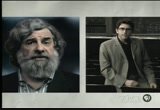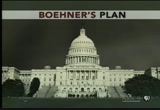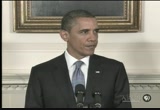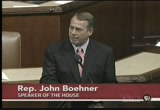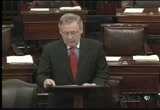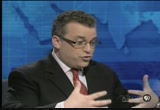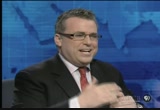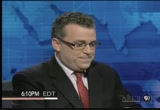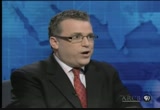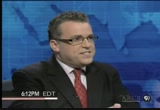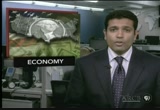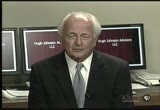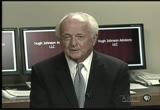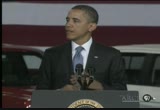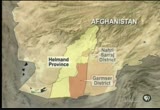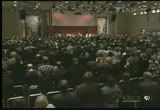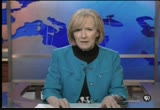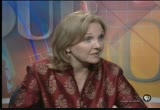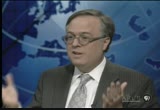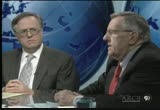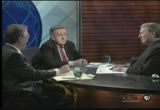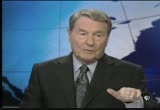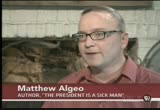tv PBS News Hour PBS July 29, 2011 10:00pm-11:00pm PDT
10:00 pm
captioning sponsored by macneil/lehrer productions >> lehrer: senate democrats planned to move on their bill to raise the nation's borrowing limit, while house republicans reworked their version. good evening, i'm jim lehrer. >> woodruff: and i'm judy woodruff. on the "newshour" tonight, kwame holman has the latest on the race to avert a government default with just three days to go. plus, we debrief "newshour" political editor david chalian. >> lehrer: then, jeffrey brown gets an update on the famine in the horn of africa from the head of the world food program. >> woodruff: mark shields and michael gerson analyze the week's news. >> lehrer: and ray suarez has
10:01 pm
the story of the secret cancer surgery performed on president grover cleveland in 1893. >> the tumor had to be removed, the location of the operation was the big question. it was cleveland himself who recommended going on a boat. >> lehrer: that's all ahead on tonight's "newshour." major funding for the pbs newshour has been provided by: >> well, the best companies are driven by new ideas. >> our history depends on new ideas. we spend billions on advanced technologies. >> it's all about investing in the future. >> we can find new energy-- more cleaner, safer and smarter. >> collaborating with the best in the field. >> chevron works with the smartest people at leading universities and tech companies. >> and yet, it's really basic. >> it's paying off everyday. and the william and flora hewlett foundation, working to
10:02 pm
solve social and environmental problems at home and around the world. and with the ongoing support of these institutions and foundations. and... this program was made possible by the corporation for public broadcasting. and by contributions to your pbs station from viewers like you. thank you. >> lehrer: senate democrats vowed to stay in session around the clock to resolve the debt crisis. house republicans modified their plan with hopes of swift passage and president obama appealed again for compromise. "newshour" congressional correspondent kwame holman has the latest from the capitol. >> we cannot wait for the house any longer. it is time for republicans to stop the political games and embrace compromise. >> reporter: those words from the senate's top democrat majority leader harry reid reverberated across the capitol,
10:03 pm
as lawmakers remained divided over how to avoid a potential default. reid announced he would move forward on a plan to cut the deficit by $2.2 trillion over the next decade. the proposal would raise the debt ceiling by $2.7 trillion to allow the government to continue borrowing through early 2013. in addition, reid's plan would establish a joint congressional committee to come up with recommendations for additional deficit reduction methods. unlike reid's plan, the one put forward by house speaker john boehner would increase the debt limit in two stages, starting with $900 billion in borrowing authority now. lawmakers then would vote on a second, $1.6 trillion hike in january to pay the country's bills through the end of next year. reid said this afternoon democrats would not support any short-term extension. >> we cannot be in this battle all the time. right now the extremists have
10:04 pm
locked down this congress, we're doing nothing. the extremists have locked down the white house, they're not able to do their work. the country is in an economic malaise and they want to keep this up? >> reporter: speaking at the white house this morning, president obama said boehner's plan had no chance of becoming law. >> what's clear now is that any solution to avoid default must be bipartisan. it must have the support of both parties that were sent here to represent the american people-- not just one faction. it will have to have the support of both the house and the senate. >> reporter: as democrats were writing off the boehner plan, republican leaders were re-writing it today to come up with the 216 votes needed for passage. their solution: a provision that would require congress to pass a balanced budget amendment to the constitution, before raising the debt ceiling a second time. g.o.p. rules committee chairman david dreier said the change had strengthened the overall measure. >> this looming crisis is not
10:05 pm
the fundamental problem, we have a much longer term problem. the fed government spends more than it has. we don't have a debt ceiling problem, what we have is a debt problem. >> reporter: ohio republican >> i stuck my neck out a mile to try to get an agreement with the president of the united states. i stuck my neck out a mile. i put revenues on the table. in order to try to come to an agreement to avert us being where we are. but a lot of people in this town can never say yes. a lot of people can never say yes. this house has acted, and it is time for the administration and
10:06 pm
time for our colleagues across the aisle put something on the table! tell us where you are! >> reporter: democratic senator chuck schumer of new york said boehner's new plan was even worse than the original. >> it wouldn't just make a default likely, it will guarantee a default. so the boehner proposal says we won't default now, but we promise you we will default by january. it is an absurd, absurd proposition. >> reporter: the senate's top republican mitch mcconnell accused democrats of standing in the way of progress. >> rather than working these last few days towards a solution to this crisis the way the republican majority in the house has, the democratic majority here in the senate has been wasting precious time rounding up no votes to keep this crisis alive. >> reporter: looking for a way to break the stalemate, the president-- as he did in his speech monday night-- called on americans to make their voices heard. >> if you want to see a bipartisan compromise-- a bill that can pass both houses of congress and that i can sign-- let your members of congress
10:07 pm
know. make a phone call. send an email. tweet. keep the pressure on washington, and we can get past this. >> reporter: that prodding by the president again precipitated a significant spike in external calls to congressional offices, jamming phone lines. and the president's re-election operation followed up on his comments by urging people over twitter to contact certain republican senators. the pressure to reach a deal likely will continue over the weekend, as lawmakers work to beat the august second deadline. >> woodruff: for more, we turn to "newshour" political editor david chalian. welcome back, david. so, does boehner have the 216? >> just a short while ago i got offer with a top aide in his office, and he asures me that they do have the votes after they rejigered this plan. speaker boehner made the plan more attractive to conservatives
10:08 pm
by adding in the balanced budget amendment. caved, what happened last night? were there enough republicans who gave a commitment to boehner and then chk changed their mind or did he just never have the vote in the first place and he misread it? >> i'm told nobody changed their mind or promised the speaker their vote and did not deliver for him. my sense of what happened after talking to a lot of people on the hill today, judy, is the republican leadership team was trying a bit of bravado. some of these tea party freshmen started to understand the speakerer's argument on this, on why they needed to pass something and i think they started getting a little bit ahead of themselves thinking they had the votes. as they got near the wire, they realized they did not have the votes. and instead of twisting arms and getting the 216 votes last night mr. boehner is aware they're going to need another vote. something is going to go to the senate and something is going to
10:09 pm
come back. he's going to need that last bit of leverage with his members not last night but at the final vote down the road to get something to the president's desk. >> woodruff: so that being case, what happens after this? it's got to go to the senate. the senate has said we're not going to the boehner bill that's coming out of the house. so what happens is this. >> senate democrats said that before it became a more conservative bill today, right. so this-- this bill that boehner is producing out of the house tonight is clearly dead on arrival in the senate, but this is what harry reid's plan is. he has a deadline of midnight tonight ask this is due to a lot of sort of senate procedures that we don't need to get into, but in order to get something to the president's desk in time for the tuesday deadline, harry reid must file a bill tonight by midnight. he will take whatever the house passes, probably, gut it, and put his own bill in. as you and i are talking here, he's trying to see if he can work out a deal with senate republicans and put forward tonight perhaps a compromise
10:10 pm
position. if he can't do that, he's going to have to do this bill that harry reid has been talking about about, that kwame mentioned in the piece, the democratic version of how to raise the debt ceiling and the clock starts ticking for a series of votes, the first 1:00 in the morning on sunday, sen 7:third thirt in the morning on monday, and finally tuesday in the afternoon with only a few hours to go before the government risks default. >> woodruff: i am told the final vote has begun on passage of the boehner plan, the debt ceiling, and it will take 15 minutes so we will know a little later in the program. given what you just said, is there common ground to reach an agreement between what the house wants and what the democrats want and the president? >> right, you heard the president say again today we're not that far apart. there is a ton of common ground, and i think that gets lost here. remember, both sides, spending cuts only. no tax increases, no entitlement reform. so there's common ground there
10:11 pm
right away. the other key part of common bround groundbetween the two bill,the two versions here is the committee of 12 in the congress, a joint committee, equal number of republicans and democrats, house members and senate members to work on future deficit reduction, that grand bargain that speaker boehner and president obama couldn't get, this committee would try to work on that kind of tax reform, additional spending cuts, touching entitle ams and what have you. in both bills, the big question, the big divide is how do you enforce what that committee of 12 comes up with in the future? how do you enforce that it becomes law the cuts that they come up with in the future? >> woodruff: and the president, the white house is all right with this idea? >> well, they're okay with this idea of this committee coming up with ideas, but i spoke to a white house aide earlier today. i they would like to see-- let's put in some real bad punishment for both sides that taxes go up or dramatic spending cut happen automatically if what this committee comes up with does not
10:12 pm
become law. speaker boehner, of course, says no, no, no. we're going to do this again. let's tie it to debt ceiling, that should be enforcement, we're not going to get a second round of increase in the debt ceiling if indeed the deal the committee comes up with does not become law. >> woodruff: just to be clear, the second round the republicans have been talking about, is that likely to survive or what? >>? >> my sense from the white house is they don't mind the notification of a second round generically, what they mind is this environment that we're seeing now, this do you understand countdown, they do not want the second round to get another increase in the debt ceiling tied to more spending cuts. they want to decouple these processes. deal with the spending cuts and deal with the deficit reduction on one track and future increases in the debt ceiling on another track. the republicans say no the two need to remain combined.
10:13 pm
>> woodruff: i know what you're going to be doing this weekend what you were doing last weekend. >> exactly. >> woodruff: david chalian, thank you. >> lehrer: still to come on the "newshour": the famine in the horn of africa; mark shields and michael gerson and a president's secret operation for cancer. but first, the other news of the day. here's hari sreenivasan. >> sreenivasan: new economic data released today showed u.s. growth is slowing considerably. the commerce department reported the economy expanded at a rate of 1.3% in the second quarter far below expectations. and first quarter growth numbers were revised sharply downward. the latest figures reveal the u.s. economy is still smaller than it was when the recession officially began in 2007. that news combined with the debt ceiling debate in washington dragged stocks on wall street down. the dow jones industrial average lost nearly 97 points to close at 12,143. the nasdaq fell more than nine points to close at 2756. and for the week the dow lost 4%. the nasdaq fell 3%. for more on this, we turn to
10:14 pm
hugh johnson, chief investment officer at his firm. thank for being withs you. >> nice to be with you. >> sreenivasan: first things first, when you saw those numbers this morning, were you surprised? >> yeah, i was surprised and, obviously, very disappointed, surprised, i think, translate point of view of myself and just about every economist i know was forecasting something a little bit better than, that something close to 1.8%, 1.9%. so when it came ina 1.3, obviously, that's a little bit of a prize. but primarily a disappointment. i mean, if you look at these numbersue mentioned the revision of the first quarter-- if you look at these number, the economy is very, very weak, whether we measure is by g.d.t., which today that's our scoreboard for the economy, or employment thp ppa this economy is not doing very well. very, very soft and very, very disappointing. >> sreenivasan: what about consumer spending numbers? a lot of times people say the
10:15 pm
economy is propped up by people spending and that seems to be going down. >> that's the most important part of our economy. that's 70% of our economy. if you look at the report and ask are there any surprises or reasons for the weakness we saw, the first one that jumps out is consumer spending. consumer spending was significantly softer or weaker than we expected. we knew it was going to be soft. we knew food prices went up. we knew prices at the pump went up. we knew there were disruptions in the automobile sector and, therefore, spending on automobiles declined sharply in the second quarter. we knew all that. we didn't know there would be such a sharp retrenchment in the second quarter as it turned out to be. it was very, very weak. the other reason for the weakness in the report was spending by government,primarily state and local governments. that woe expected. but slowdown in consumer spending was very, very significant. >> sreenivasan: hugh johnson, thank you for your time. >> you're welcome.
10:16 pm
fuel standards for cars and trucks are going up. president obama made the announcement today in washington in a compromise deal worked out with 13 major automakers. under the new standards, fuel efficiency for cars and light trucks would double to 54.5 miles per gallon by 2025. they'll be phased in beginning with 2017 models. president obama said the savings are vital to reduce dependence on foreign oil and save money. >> think about what this means. it means filling up your car every two weeks instead of filling it up every week. it will save a typical family more than $8,000 in fuel costs over time. and consumers in this country as a whole will save almost $2 trillion in fuel costs. that's trillion with a "t." the new standards will also cut greenhouse gas emissions from exhausts in half. the deal was less than what environmentalists and public health advocates had pushed for, but more than what detroit automakers wanted.
10:17 pm
tropical storm don churned towards southeastern texas today. it packed maximum sustained winds of 50 miles per hour. it was expected to make landfall near corpus christi later tonight. but many coastal communities were already experiencing strong winds and rough surf. texas needs the rain. more than 90% of the state is currently in extreme or exceptional drought. a pair of roadside bombs in southern afghanistan today killed at least 19 people, including some children. both blasts went off in helmand province, when a minibus and a tractor struck separate mines. meanwhile in the east, a bomb killed two nato service members. there was no word on their nationalities or the specific location of the attack. thousands of egyptian protesters gathered in cairo's tahrir square today, six months after a popular uprising made the square famous. it was filled with egyptians supporting a variety of political movements, including ultraconservative muslims calling for the implementation of strict islamic law. protestors braved the heat to step up pressure on the country's ruling military
10:18 pm
council and repeat demands for reform. it was one of the largest crowds to fill tahrir square since president hosni mubarak was ousted from power in february. norwegians paused today for memorial services and the first funerals of the victims of last week's twin attacks. the number of dead was raised to 77. and police said it was likely the self-confessed killer, anders behring breivik, acted alone. we have a report from emma murphy of "independent television news." >> reporter: led by a priest and an imam, the first of norway's funerals was a renunciation of all anders breivik stood for. christians and muslims standing gether to mourn 18-year-old bano rashid. she'd fled iraq for sanctuary in norway, yet died in the kind of attack that will be shocking even in her homeland. the girl known as sunrays for her happy demeanor, the first muslim to be buried in this christian graveyard. >> she was sunshine, i mean everybody she met was touched by her smile and she was happy all
10:19 pm
the time and it was just. she was very engaged, she worked a lot with politics with solidarity, helping other people, and she was just amazing. >> reporter: across norway services have been held to remember the dead a week on. the governing labor party whose offices were bombed in targeted gathered just yards form the scene of the first attack. prime minister jens stoltenberg leading shattered country in another minute's silence. on the mainland close to utoya island a scene of such horror a week ago flowers were laid in memory of those sought out and shot down by breivik. how relaxed those young victims were in the hours before their deaths is clear from these newly
10:20 pm
released photographs. they offer a glimpse of the idyllic environment breivik violated and the young people he killed. >> sreenivasan: a court also appointed two psychiatrists to try and discover why breivik staged the attacks and determine whether he is insane. they have until november 1st to report back. those are some of the day's major stories. now, back to judy. >> woodruff: and to the growing desperation in the horn of africa. more than 11 million people are at risk from hunger in somalia, kenya, ethiopia and djibouti. somalia is the worst hit by famine, drought and a civil war with islamic militants. nearly half a million refugees have left somalia to go to kenya. most are headed to the dadaab camp just inside the border. we begin with a report from martin geissler of "independent television news." he's spent a week reporting from the camp. a warning: some of the images are distressing. >> reporter: the patients just keep on arriving. there is no weekend for the
10:21 pm
staff at hagadera's children's unit. time here is measured in bed space. today as ever the ward is packed, but the doctors are happy. two of the babies causing most concern are improving. when manaj was admitted on monday, he was close to death. at seven months old, he weighed just 6.5 pounds. five days on he's improving. still weak and still frail, but still alive. >> ( translated ): surviving a nearly a week. he fought for his life. we are giving him the best of care. >> reporter: he's had quite a week hasn't he? >> yes, quite a week, yeah that's great. >> reporter: at the start of the week three-year-old adan was struggling too. he wasn't responding to treatment. doctors feared the worst. now he's eating solid food a huge step in the right direction. >> tom: it's been a dreadful
10:22 pm
time, i didn't know if my child would live or die. his mother's dead, but i'll do my best to look after him. i'm not going home though. i'd rather die in kenya than try to live in somalia again. >> reporter: abdi rachman though is not doing so well. admitted yesterday with severe malnutrition, he developed hypothermia over night. the camp that feeds the hospital is already overcrowded and almost 1,500 more somali refugees arrive here every day. the staff at the clinic are bracing themselves. >> when you look at the weather it's about to rain that comes with other dangers: communicable diseases like cholera. right now we're in the midst of measles outbreak. so with more people coming into a camp that's already bursting at its seams all these, i mean, it's a very precarious situation for us here in hagadera. >> reporter: this is the equipment doctors use to bring little manaj here back from the brink. according to hospital supply
10:23 pm
lists it costs under a pound. now, clearly there's more to fighting off a disaster than just a syringe and a drip. there's staff, transport, food, shelter to pay for on a massive scale for a long time, but it's proof, if proof were needed, that every little helps they're setting up a tent this evening to cope with the overspill of children. it's far from ideal, but needs must. the pressures here grow hand in hand with this crisis and sadly there's no let up in sight. >> woodruff: jeffrey brown takes the story from there. >> brown: the united nations world food program has been airlifting food and supplies into the affected areas of the horn of africa. the second flight into mogadishu arrived just today. it's also raising funds to pay for aid so far more than $250 million from donor countries and has said it needs to double that to support operations over the next six months. the program's director,
10:24 pm
josette sheeran recently returned from the region. she joins us now. welcome to you. what is your current assessment of the situation in those camps we saw, and in somalia? >> well, i was just in those camps, ask it really is an unfoiledding tragedy as people flee areas in somalia where aide workers have not had any access. about 60% of the people in somalia have been inaccessible to aid and those are the people you're seeing in the camps. many of those people have walked for weeks, sometimes up to six weeks, and many of the women i talked to reported having to leave children along the road who were too weak to make it and dying on the way to the camps. >> brown: who is affected most? is it the children like we saw? >> it's been called "the children's famine" so the particular area inside somalia that has been declared the famine zone again has been inaccessible to aid. the reason it's hitting children
10:25 pm
the hardest is they're the weakest when they go without food and water. they simply cannot go for all of those weeks and if they are not given access to the types of food you saw in your video, some of the ready-to-use food, and we're trying to airlift in the supplies to get closer to them, to these areas that aid workers have thought been allowed in. >> brown: let's talk a little bit about the inac cessibility issue. somalia, the worst-hit country, at least some elements of the militant group al shabaab have been trying to prevent food from being dispersed. how do they do that and how much impact is it really having? >> it's important to understand it affecting the whole horn of firework, about five countries, and we're currently reaching 10 million people with aid, including $1.5 million in somalia. it's the 60% under the control of groups that do not want aid coming in, where there are little pockets of access but not enough to get in there and
10:26 pm
really give them life-saving support. people are on the move, and these roads of death, they're turning into roads of death, because they cannot make it farr enough. the elderly, especially, ask the young which were. >> brown: and this is a country without a real functioning government that is able to just go in and do something. >> well, i was in mogadishu a few days ago,. we're reaching 300,000 people. we're airlifting in more supplies. we can't keep up with the demand that's coming from southern somalia into mogadishu, but just two days ago, there was a shoot-out at the camp there where the i.d.p.s, the displaced people are, and everything was looted, including the food there where people were working. so it's very dangerous, and the world food program has lost 14 workers since 2008 in somalia just trying to help feed kids. >> brown: i want to ask you about another complexion, the u.s. anti-terror laws that restrict aid from going to places like somalia where it
10:27 pm
might get into the hands of al shabaab. how much do you think that is a factor and do you think temporarily such restrictions need to be lifted at this point? >> given the life-and-death situation, the united states now has really encouraged us to get into all the areas in somalia we can, where we can provide assurances that we're reaching people most in need. and so the u.s. has contributed $60 million to help the people in somalia. and we're now reaching some of the areas that now are are newly accessible, but also in the north and are center, we can wreech, again, over 1.5 million people. this support is vital. and, , again, we're airlifting in these nutritional products for children with the support of the u.s.. >> brown: is the situation in terms of access better in the countries surrounding somalia? >> oh, absolutely. this is the worst drought
10:28 pm
declared in 60 years. but we have to ask ourselves why we're not seeing death in ethopia or kenya like we would have in past droughts, and in part it's because resiliency efforts have been put in place. the world food program, we have been building up our after thes since last august, seeing this drought coming and where we can reach people, we're not seeing the times of daegz or out-of-control situation. so the world actually has been doing a good job, and our world has contributed half a billion dollars so far since january to build up supplies to the people affected by this kraut. >> brown: how does something like this happen? you keep talking about a drought, and that's been a long time in coming. every time there is something like this, there is a manmade lem to this, i suppose. we knew it was coming and there it is. you watched events like this, how does it happen? >> droughts may not be avoidable
10:29 pm
but famines are. what we are seeing again is in this place where this epic drought has hit, there's no water, there's no vegetation anywhere. i've flown over most of the region. this can be prevented with not only pre-action but then emergency action when it really gets terrible. this happens. we've seen epic flooding in other places in the world, earthquakes. this is a natural disaster. it's when you can't get access to people that you see it turn into a famine. a fam famine is about the state of individuals, not of the weather. so the famine means that you have severely malnourished populations. anything over 15% malnutrition rate is an emergency, and we've seen areas in somalia now with over 45%. that's almost half the children in critical shape like this video that you just saw. >> brown: and before we end, you raised a certain amount of money. you were talking about the amount from the u.s. but you say
10:30 pm
you need double that over next six months. >> yes. i'm putting out a urgent call. i got a call from the saudi arabian finance minister who gave $50 million. we've seen canada, australia. we've seen europe, we've seen japan even as it suffers from its own disasters coming in, and some of the nations of africa offering help, africa helping africa. this is very important. we need in this year about $1 billion will have been spent to protect lives, and we need the world to respond to this last $250 million that's vitally needed. >> brown: all right josette sheeran is direct of the world food program. thank you very much. >> lehrer: and to the analysis of shields and gerson. syndicated columnist mark shields and "washington post" columnist michael gerson. david brooks is off tonight.
10:31 pm
a few moments ago, the house of representatives did, in fact, pass the boehner bill by a vote of 218 to 210. they needed 216 to pass. there were no democrats among those 218. michael, what words would you use to describe, as a result of that vote a few moments ago, where we are now? >> well, i think it would be fascinating if it weren't so frightening. we have a situation where about 10% of the republican caucus in the house wanted to humiliate their own speaker in order to get a vote on a balanced budget amendment that is symbolic and completely irrelevant to the process. i think that's a sign of weakness on the republican part. it undermined their negotiating status in the senate. i think harry reid now has a lot of cards. i think he's gone to mitch mcconnell and said, what, do your people need to support my approach, the reid approach?"
10:32 pm
and that's what i believe to be the main approach that's taken and the housing will have to look at it again and they have to pass it with democratic support. >> lehrer: mark, what's happened? >> the irony, jim, one week ago we were on the kupgs of-- cusp of $4 trillion in deficit reduction. we are not today anywhere near that. at the same time-- >> the boehner bill is $9 billion over 10 years and triggers more-- >> and to go through this again in six months. i think that's its most endearing feature. and at the same time, it also included the deal with the speaker and the president worked on, lower cuts in budget spending right now. when you can least afford budget cutting right now, because we've got ap economy, as we learned today, that is struggling, that is wounded, that is sluggish,
10:33 pm
that's hurting. you can make an ideological argument to cut spending, but at this time you cannot make an economic argument to do it. i think it heads to the senate, i think mitch mcconnell will emerge. harry reid and mitch mcconnell are the last two standing trees in this forest. a week ago it was the president of the united states and the speaker of the house. they have both been effectively sidelined by the events of the past week. >> lehrer: do you agree, it's up to those two guys now? >> i completely agree. senator reid are has initiative right now. there will be modifications in his approach in order to get some republican senators but that's the likely course here. but i do think it's a real challenge to boehner who now may have to get, i don't know, 60-some democratic votes at least in order to pass whatever happens. that's going to be itself a pretty difficult task. >> lehrer: you're assuming something comes out of the senate and goes back to the
10:34 pm
house. >> back to the house, and there won't be much time to make adjustments in this process with a tight time frame. >> lehrer: pick up on what you said earlier, explain one more time, why the whole constitutional amendment thing is symbolic and will have no effect on anything we're talking about now. >> i completely agree with that. you're instructing the senate it's house is instructing the senate to have a two-thirds vote in order to get a future increase in the debt deal for a constitutional amendment. i don't think you can instruct the senate to do a two-thirds vote on the sun rising in the east effectively. they're not going to accept that under any circumstance so it was entirely symbolic. >> lehrer: even if they did get that vote, it's a long process-- to amend the constitution of the united states. >> it's illusionary. they're kidding themselves. it's a fig leaf that-- to bring on conservatives who are against the rrjz plan, to give them sort
10:35 pm
of a rationale that could go back to their people and say they got the balanced budget. it doesn't say what the balanced budget amendment is. it says a joint resolution called a balanced budget amendment to the constitution. it doesn't say what it is, whether it requires two-thirds vote, as one of the proposed ones did, to raise any taxes at all, a two-thirds vote would be required. so it's ludicrous. if it weren't so-- we're trifling right now with well-being of the united states economy which is in tough shape and with the good faith and credit of this country, which has never been tampered with in 222 years. >> lehrer: all right, how does reid play this now? what can he say to mcconnell-- he's only got 53 democrats. >> that's right. >> lehrer: reid does. he has to get seven more. they have to have 60 to make this thing work. >> is-- he has to be sure to get
10:36 pm
all the democrats, too, democrats up for tough races, do they want to vote for something like this? this is what harry reid was born to do. harry reid is one of the great inside players. he's not a compelling public presence on a platform but he understands it. michael and i had a session with him three weeks ago, and i gotta tell you, he was clairvoyant. >> lehrer: you just sat down. >> just the two of us, and he described exactly what would happen. >> and this was the time the president and the summit and all the big deals and biden and everything else. and he just understands. so he's got to get something-- >>. >> lehrer: what you are saying, he told you all it's going to come down to something like this? >> he said there would be no-- nobody will touch a single gray hair on the beautiful head of medicare or social security and there will be no revenues.
10:37 pm
and that's where we are right now. that's what president endorsed essentially last friday, was the reid plan. >> lehrer: what can mitch mcconnell do? can mitch mcconnell turn his back on the boehner bill on behalf of republicans? >> well, i think to some extent he has to. it's not the basis of the negotiation anymore. house republicans added a poison pill that discredited--. >> lehrer: would that be a poison pill for mcconnell? >> the constitutional amendment? i think it's a nonstarter. there are big issues here. defense spending issues going to be very large, i think, for mcconnell because the reid approach had some serious cuts in defense spending. and then, you know,-- but mcconnell's already proposed some ideas that are likely to be incorporated in the reid-- in the reid bill that will allow the president to do a kind of second charge of increases in the debt limit without congress having much of an influence over it. congress would have to vote against it.
10:38 pm
so i think that the elements of a beale are here. you know, the problem from my perspective is, this is the easy stuff because it doesn't deal with tax,because it doesn't deal with entitlement. the question is, it doesn't even solve the deficit problem but it's been such a problem just to get the easy-- the question is that the rating agencies, the credit rating agencies and others, can can can they do the harder stuff right down the road? that, i think, is the real difficulty. >> one thing that hasn't been addressed, jim, and republicans stand guilty of this, quite frankly, this is the first time anybody has ever done this with the-- raising the debt ceiling. use it as a nonnegotiable terrorist demand. >> lehrer: nonnegotiable-- >> that's essentially what was done. if you put a peppy-- >> paul krut man of the "new york times" this morning called
10:39 pm
it extortion. >> if you put a penny of revenue a penny of revenue, if you even suggest a registered nurse in an emergency room and a new york firefighter shouldn't pay taxes twice the rate of a hedge fund manager, we leave. we're not going to be a party to that. that's that's basically where they were. but more important than that to use this vehicle, to think this that is only a one-time precedent and that next time that there's a democratic congress and a republican president that this isn't going to be used again vengefully, you talk about the poisoning of the washington well. this does it in spades. >> lehrer: do you agree, the well is poisoned beyond-- >> i think it helps poison the well. this is a reflection of the 2010 elections where a lot of ideological momentum and they were not going to accept taxes in this process. i think there is fault on both sides here. i think democrats have sat back and hoped the republicans would self-destruct which is a pretty
10:40 pm
good bet. i think the republicans have been too ideologically divided to support their own speak nert negotiations. it's a serious problem in our politics. if you were a martian coming into this process you would see a dysfunctional political process where nothing is really working. the world is looking at this. the euro in crisis, the american political system not particularly functional. there's not much economic leadership on a global level right now. those are serious things. >> lehrer: if you're right, then who exercises leadership over the next three days and gets this thing finally done? >> i think it's the senate. and there are a lot of adults in the senate. that's the place often we any to for this kind of--. >> lehrer: but you think it, done. >> i do. i think it's ugly but likely. >> remember this. mitch mcconnell has kept a low profile in large part because he was no way going to be seen as sabotaging boehner's plan. but now it is-- sglan sglim he had been supportive of boehner's
10:41 pm
plan. >> that's what i mean. but how hee knows now it's dead on arrival. it's harry reid and mitch mcconnell. whatever they pass in the senate they're anything to have to get, i would say, close to 100 democrats in house. they're going to lose half the republicans, boehner is. and to get them-- there have to be revenues in there. you might get 30 democrats to vote for it on basis it's the right thing to do. you're not going to get the necessary number of house democrats to vote for it without revenues in there somewhere, and that is going to be a real stumbling block for a lot of republicans and it's going to be tough work in the senate. >> i would only add that the big economic news of the week, the revision downward of the economic growth number, that is a long-term political problem for president obama. it makes the next set of jobs figures likely to be really disturbing. it also complicates the deficit problem in the future because
10:42 pm
all of these plans assume maybe 3% growth. we're not even at 2% growth in our economy. these are going to be a serious complicating factor in our politics moving forward sglam sglim there is another thing you wrote about in your column, the new pew study on the gap, the wealth gaps that the united states has gotten larger and larger. that's what we should be talking about tonight instead of this other stuff. >> he's absolutely right in his column which is well worth reading. when the top 1% in this country control more wealth than the bottom 90% that tells you something about the gap. >> in the 1980s, the gap between whites and african american family was about 12 to one which is bad enough. it's about 20 to one now. it's really not a sustainable circumstance over the long run for the stability of the society. it's the kind of thing you do want to address in public policy.
10:43 pm
get reasonable democrats, get reasonable republicans to do it. it's almost inconceivable in the current political climate. >> this whole experience, jim, of this deficit, debt ceiling has so diminished everybody involved in it. i saw embarrassment, professional and personal embarrassment, on the part of members of congress this week that they were part of this. and that diminishes confidence and trust and optimism about the government's ability to do anything. that's one of the casualties. >> lehrer: and does it also, to use your word, michael, poison the atmosphere for 2012, election year, presidential and otherwise? >> i agree with that. i think it creates an impression that our whole political class is incapable of dealing with the fundamental problems in our country. the republican presidential candidate will come into this, try to propose some answers, try to get some momentum. but i think it's--. >> lehrer: it's going to be there no matter what. >> yeah. >> lehrer: thank you both very much.
10:44 pm
good to see you again, mikey. >> you, too, mark. >> thank you, jim. >> woodruff: finally tonight, a true story that reads like a detective tale. with modern presidents appearing in public every day and sometimes more than once, it's hard to imagine an american president dropping out of sight for nearly a week. but that's exactly what happened in 1893, when grover cleveland underwent secret cancer surgery. the public was kept in the dark for weeks while he recuperated and for decades to follow. it's all the subject of a new book titled "the president is a sick man." ray suarez talked to its author. >> i caught up with journalist and historian matthew algeo, in president cleveland's favorite refuge from the white house it's washington, d.c. neighborhood that now bears his name, cleveland park. we sat down at the historic rosedale conservancy farmhouse just across the street from where the president's cottage
10:45 pm
once stood. math urk whenever the president has a health problem i guess it's a big deal but i guess context is important in this case, right? was a cancerous growth in the mouth at this point in american history such a big deal that they were willing to go to these lengths? >> the summer of 1893 was a terrible period in america's economic history. there was a speculative bubble in 1893 and the bubble was railroads. the barlds went bankrupt shortly before grover cleveland took office and by the end of the year 119 railroads had gone bankrupt. the markets were crashing and wall street was in a panic. and cleveland was afraid if it was known he had cancer the bottom would fall out of the markets and there would be utter financial chaos in the country. >> and cancer was still a frightening word i america. >> there was a stigma attached to cancer. the word was avoided.
10:46 pm
newspapers called it the dread disease. when cleveland's doctor diagnosed it, he said it's a bad looking tenant and you should have it removed metly. there was a stigma attached to cancer. it's almost like aids in the 1980s. people didn't like to talk about it. >> and an ex-president had died of it. >> about 10 years before, ulease ease grant had died of cancer, and it was a real spectacle, the death of grant. it became a morbid death wash by newspapers in new york. cleveland was a private guy so they came up with a plan so that americans wouldn't know the president had cancer surgery? >> well, the tumor had to be removed. the location of the operation was the big question. it was cleveland himself who came up with the idea of going on a boat. he had a friend who owned a yacht and they often went on fishing trips so the cover story would be, "i'm going to a
10:47 pm
fishing trip." they sailed from new york to the president's home-- he had a home on cape cod-- and while they were on board the operation took place. six doctors were sworn to secrety and they removed most of his upper left palette, five teeth, and upper left jaw as well. it was radical surgery at the time. >> this was a pre24-hour news cycle at the time, but, still, the president was expected to speak to the public. >> even then it was a little unusual for the president to disappear for four or five days, which is what happened. they managed to keep the press at bay. they kept him at a distance from his home on cape cod until the wound was healed well enough. it took about three weeks. and then he was fitted with a prosthetic device that he could prop in his jaw and restore the shame of his face and restore his normal speaking voice. it was really only three or four weeks after the operation when he could appear in public and
10:48 pm
speak again. >> in the 21st century, it's hard to imagine the president being officially silent for weeks at a time. >> you have to remember in 1893, in the summer, especially, it was very hot in washington, as it is still, and back then it wasn't unusual for the president and congress to leave the city for a month. it wasn't unusual to go on a long fishing trip and spend time at his summer home. the circumstance of covering up the surgery made reporters suspicious. >> the cover-up was fascinating. almost everybody kept their mouth shut for the duration, right? >> it's really amazing. it's probably one of the most successful cover-ups in american political histories. all the doctors were sworn to secrecy. there was one doctor who missed an appointment because he was on the boat for the surgery and he told the doctor he had the appointment with what who was doing and that was the first little leak. that was the first time word started to circulate, especially among doctors in new york, that something was seergsly wrong with the president. but by and large, the secret
10:49 pm
held for 24 years. >> there's secrecy and there's secrecy. beyond the doctors, almost nobody knew about the president's surgery. >> not even the vice president. and cleveland and his vice president had a very contentious relationship, so cleveland was adamant that stephenson not know he had cancer. when stephenson started hearing rumors about cleveland's help, cleveland sent him on a political trip to the pacific northwest. he sent him to seattle in 1893 which was a rather arduous trip. it took stephenson out of the picture for several weeks. >> one reporter got story. >> yeah. >> but really paid a price. >> e.j. edwards was a reporter for the "philadelphia press." he had a friend who was a doctor in new york is and heard the rumors and edwards tracked the story town downand confirmed it and about two months after the operation edwards published the report in the philadelphia press. the headline was, "the president a very sick man." it was really an amazingly detailed account of operation
10:50 pm
performed on the yacht. it's probably the most explicit account of a presidential operation, presidential medical procedure published without the president's permission ever. it was an amazing scoop, really one of the great scoops of the 19th century. problem was, cleveland had a reputation for honesty and this went back to his first campaign in 1884. it came out he allegedly fathered an illegitimate child and teleyaved his friend in buffalo and said, "tell the truth." this gave him a reputation for honesty. when the report came out, cleveland dismissed it. his aides said he suffered nothing worse than a tooth ache. they not only denied the story but the policy was to discredit the reporter so cleveland's ally in the democratic press really vilified the reporter calling him a cancer faker, disgrace to journalism, panic mongerer, these sorts of things. in the end, the public believed the president. his nim nak was the honest president and it's as if he had all this political capital built
10:51 pm
up and decided to spend it on this one. >> did the reporter's career suffer? >> edwards bounced from paper to paper pip can't say his careers ruined but it suffered. he was vindicated. cleveland lived 15 years after the surgery, an amazing achievement in american medicine. final-- one of the doctors who took part in the operation and felt bad about the way edwards was distreated, this doctor decided to finally publish an account of the operation. he published it in the "saturday evening post" of all places, not a medical journal, and i think the doctor wanted to brag a little bit because it had been a successful operation but he also did it to vindicate edwards. ededwards was alive and gratified by this and it was 24 long years to be vindicated. he and the doctor described it as a truthful correspondent.
10:52 pm
>> you've got politics, medicine a little 19th century media coverage. it's a great story. how did you first get into it? >> actually, the tumor itself was saved, and it's in a museum in philadelphia. it's a great museum of all kibdz of medical oddities. if you want to see chief justice john marshall's bradder stones that's the place to go. about 10 years ago i was visiting the museum and i'm interested in presidential-- arcane presidentialrivia so i saw tumor there and that's what got me interested in the story. one of the doctors deposited all his papers at the museum and they had a lot of papers talking about the surgery. that's where i began looking into the story. >> you talked about parallels. have there been other times in american history where presidents tried to hide how sick they are? >> lots, surprisingly. woodrow wilson suffered a stroke
10:53 pm
with about 18 months left in his term and was basically incapacitated the last year and a half and this was a very important time. harding had terrible heart failure. the interesting thing is presidents don't always get the best health care. when the president is the patient, the patient often dictates the terms of treatments as was the case with cleveland, to have the operation on a boat. i mean, it was just an insane idea but nobody would say no to the president. hard had gone such terrible heart failure but the white house doctor was an old family friend ohio, a homeopath and he liked to prescribe pills by colors. you see examples of presidents who had poor health and poor health care. james garfield got shot shortly after taking office and so many doctors put their fingers in the wound to try to find out where the bullet went, that an infection developed and that is what actually killed him. it's thought if they'd just taken garfield back to the white house, put him in bed, gave him some water he probably would
10:54 pm
have recovered because the bullet was lodged harmlessly. >> could anything like this happen today? >> all i'll say is there is a fully equipped medical operating theater on air force one. if you took a long trip and didn't have a lot of turbulence, maybe. >> "the president is a sick man.". matthew algeo, thank you. >> thank you, ray. >> lehrer: again, the major developments of the day: house republicans passed a bill to raise the nation's debt limit and avert default. and senate democrats planned to move on their version. president obama appealed for compromise. and new economic data released by the commerce department showed u.s. growth is slowing considerably. that news-- combined with the debt ceiling debate in washington-- dragged down stocks on wall street. and to hari sreenivasan for what's on the "newshour" online. hari? >> sreenivasan: gwen ifill
10:55 pm
reflects on washington's war of words as the debt debate gets down to the wire. for a different perspective on the aftermath of the norway attacks find jeff's conversation with best-selling norwegian crime novelist and former justice minister ann holt. that's on art beat. and on a lighter note, ever wonder how other nations beer- guzzling habits compare to ours? paul solman has an interactive graphic that examines drinking patterns and how they relate to economics on his "making sense" page. all that and more is on our web site: newshour.pbs.org. judy? >> woodruff: and that's the "newshour" for tonight. on monday, we'll update the debt talks, a day ahead of the deadline for default. plus, paul solman gets perspective from wall street. i'm judy woodruff. >> lehrer: and i'm jim lehrer. "washington week" can be seen later this evening on most pbs stations. we'll see you online and again here monday evening. have a nice weekend. thank you and good night. major funding for the pbs newshour has been provided by:
10:56 pm
>> and by the bill and melinda gates foundation. dedicated to the idea that all people deserve the chance to live a healthy productive life. and with the ongoing support of these institutions and foundations. and... this program was made possible by the corporation for public broadcasting. and by contributions to your pbs station from viewers like you. thank you. captioning sponsored by macneil/lehrer productions captioned by media access group at wgbh access.wgbh.org u forget it. yourself, so don't fall.
238 Views
IN COLLECTIONS
KRCB (PBS) Television Archive
Television Archive  Television Archive News Search Service
Television Archive News Search Service 
Uploaded by TV Archive on

 Live Music Archive
Live Music Archive Librivox Free Audio
Librivox Free Audio Metropolitan Museum
Metropolitan Museum Cleveland Museum of Art
Cleveland Museum of Art Internet Arcade
Internet Arcade Console Living Room
Console Living Room Books to Borrow
Books to Borrow Open Library
Open Library TV News
TV News Understanding 9/11
Understanding 9/11
